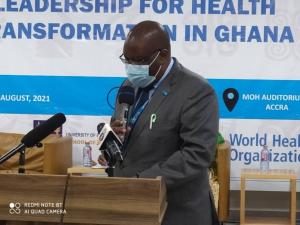• WHO launches Leadership for Health Transformation Programme to provide high-level strategic leadership to Senior Managers of Ghana’s Health Sector
Universal Health Coverage (UHC) has gained momentum, especially among developing countries. Ghana’s UHC Roadmap, launched in 2020, will shape health care in the country till 2030.
Straightening all crooked paths leading to the achievement of UHC, where all people have access to the health services they need, when and where they need them, and without financial hardship requires a critical look at health sector reforms.
In its quest for attainment, Ghana identified health sector governance and leadership across the different components of the health system as an area requiring some attention if there could be any progress. Good health sector governance and leadership are critical to the different components of health systems; including, infrastructure, medicines and medical products, health workers, health information, and health systems financing, as well as to the interactions between them.
Addressing health sector challenges and transforming the health system requires strong skills and a state-of-the-art understanding of what it takes to achieve Ghana’s UHC strategic priorities. To support in this regard, WHO Ghana in collaboration with the WHO Regional Office for Africa is supporting the Ministry of Health to build the necessary leadership and management competencies to drive its reform agenda and effectively address the rapidly changing pandemic context through the Leadership for Health Transformation (LHT) programme.
The Programme aims to provide the required high-level leadership and strategic support to senior leaders in the health sector to enable them to transform health outcomes in their countries. It focuses on nurturing a new breed of agile leaders for whom learning and self-reflection constitute their ways of working. LHT also seeks to increase personal and interpersonal awareness of health professionals, sharpen their analytical skills and gain a greater understanding of the complex issues facing managers in the operationalization of the new National Health Policy and the UHC Roadmap in Ghana.
At the launch of the Leadership for Health Transformation programme, Dr Joseph Cabore, Director for Program Management, WHO Regional Office for Africa disclosed that the holistic approach to leadership development was initially developed for WHO Africa Regional Office staff. He said following its success, the Regional Committee of 2019 recommended that the program be extended to Member-States. The programme was piloted in Congo in 2020 and was happy to launch it in Ghana.
Dr Cabore, who represented the Regional Director, Dr Matshidiso Moeti, lauded the government of Ghana for its efforts in introducing extensive changes to health sector governance through this program adding that the Ministry of Health was working with the WHO Country Office to design a bold, relevant and timely program that would contribute to making Ghana's health leadership community more results-oriented, accountable and better equipped to deliver on their mandate of improving the health of every Ghanaian.
Minister for Health, Hon Kwaku Agyeman-Manu, in a speech read on his behalf, acknowledged that leadership is central to the stewardship function of the Ministry and a key ingredient to achieving Health System goals. “Leadership and Governance transform our book knowledge into impact-driven innovations in our organization to drive the personal and organizational change needed within the health sector” he added.
Ghana has defined UHC as: All people in Ghana should have timely access to high-quality services irrespective of the ability to pay at the point of use.
WHO Representative to Ghana, Dr Francis Kasolo hinted that the Department of Health and Social Care, United Kingdom, through Foreign, Commonwealth Development Office (FCDO) Ghana, has pledged its support to the Programme by committing funds to finance the next cohort. He said the act was a demonstration of common interests, goals, and complementary strengths by the institutions.
Thirty participants selected from the Ministry of Health and Agencies, including the Chief Director, Directors of the Ministry, CEOs as well as Deputy Directors from the Agencies will make up the first cohort of the programme. They will be provided with a dynamic and valuable learning experience over the next four months.



